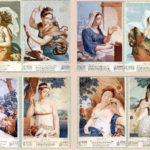Turkey is one of those countries where people are proud of being Asian, and at the same time dream of becoming European. Geographically the division exists; the Asian and European parts are separated by the Bosphorus, the Sea of Marmara, and that wretched channel of the Dardanelles that has always caused such trouble and bloodshed.
The smaller, European part is bounded by Bulgaria and Greece. The very much larger Asian sector comprises the whole of Asia Minor, known as Anatolia. The Black Sea is to the north, Georgia, Armenia and Iran to the east, Iraq and Syria on the south, and coasts on both the Aegean and Mediterranean Seas: surrounded by big trouble as you can see.
As if this was not troublesome enough the whole plateau is subject to appalling earthquakes as it lies at the joining of crustal plates.
Modern Turkey evolved from the Ottoman Empire, finally broken up at the end of the First World War. The Versailles Peace Conference ensured that parts of the east coast of the Aegean around the city of Smyrna (Izmir) were for Greece, while the Anatolian Peninsula was to be partitioned, with a separate state of Armenia created on the Black Sea. This naturally set off a period of open unrest and dissidence, led by Turkish leader Mustapha Kemal. A Greek army aproached from Izmir but was eliminated. Izmir was taken, Armenia occupied and a new Treaty of Lausanne had to be negotiated.
This new segment of the Treaty of Versailles recognised the frontiers, but obliged a half million Greeks and half million Armenians to uproot and leave the country. It was July 1923. In October the New Republic of Turkey was proclaimed, with Kemal as President. His dazzling reforms immediately earned him the nickname of ‘Atatürk’ meaning ‘father of the people’. But this father believed in one-party rule which continued under Kemal’s deputy Ismel Inonu until 1950. The first-ever open general elections were held in this year and the free-enterprise opposition Democratic Party were able to start a ten-year rule.
As happens only too often in this part of the world, the democratic regime was ended by a miliary coup. Civilian rule was re-established in 1961, but the military ruled again from 1971 – 73. Kemal’s neutralist policy had been abandoned in 1952 when Turkey joined the North Atlantic Treaty Organisation. Her friendly relations with the remaining Great Powers were heavily tried when Turkey invaded Cyprus in 1974. The United States placed a trade embargo where it would most hurt, but this was lifted in 1978.
Tension between left and right wing factions, hostility among the minority Shiites to any plans for Westernization, as opposed to the enforcement of Islamic puritanism, squabbles between Kurds, Turks and Armenians etc. have continued to bedevil the country’s attempts to join Europe as a full member of the Union.
Yet another military putsch under General Evren overthrew the civilian government of Demirel, but under Presidents Evren (1982-87) and Turgot Ozal (1087-93) some political stability was established, and more concern was shown for human rights. Martial law was lifted in 1987, and the state of emergency ended in 1988. Some other parties were established; among them the neo-fascist National Workers’ Party. Meanwhile the Kurish Workers’ Party, on behalf of Turkey’s 12 million Kurds, carried on with its armed campaign for an independent Kurdistan.
Turkey, perhaps carried away by the elder Bush, participated in the Gulf War and lost some $6000 million as a result. In 1989 the European Union postponed consideration of Turkey’s application for membership as a result of her human rights violations.
Since the early 90s of the last century Turkey ha struggled to maintain democracy, with varying results. 1993 saw the election of the first woman prime minister, under Demiral as President. Islamic fundamentalism has caused unrest. Parties have been formed, and have collapsed. The nineteeenth century appallation of Turkey as of ‘The Sick man of Europe’ no longer applies, but Turkey has a long way to go, cursed by the nagging irritation of being both Eastern and Western in outlook.








Leave A Comment